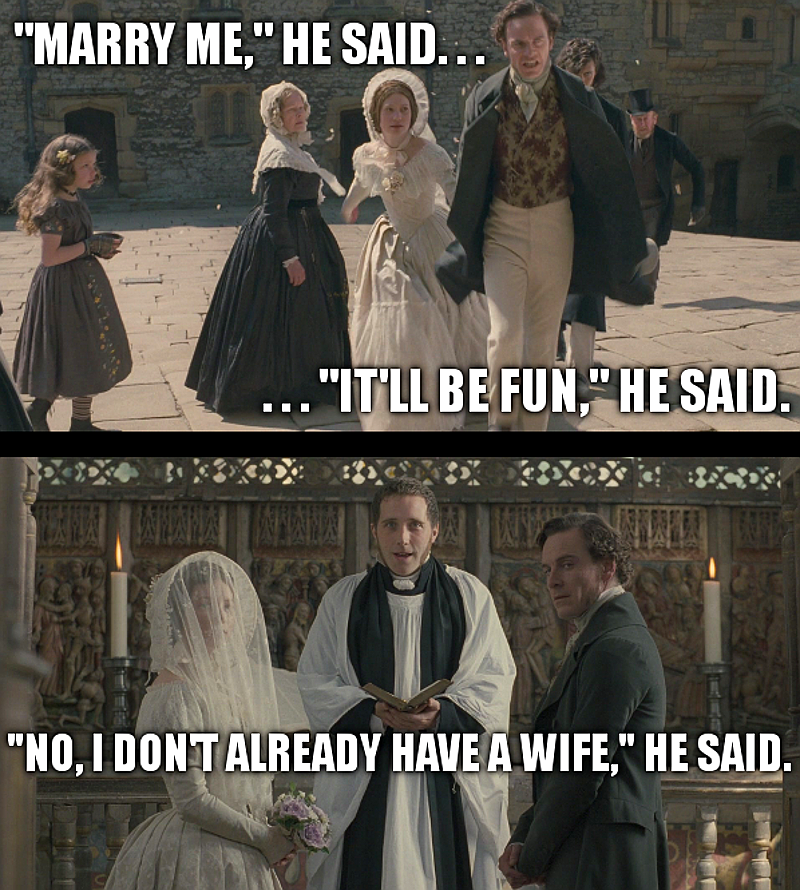Verdict: Heart wins in the romance category, but Head
wins when Jane chooses rationality when she could have become like Bertha.
* Source: http://24.media.tumblr.com/tumblr_mbg2hobYBj1r8f9bno1_1280.png
Many Jane fans (of Austen-and-Eyre variety) will be
disappointed to find out that Charlotte Brontë was not much of a fan of Jane
Austen. Remember that the Brontë sisters
were writing at the beginning of the Victorian Era, specifically the Romantic
Period of the arts, which was directly reacting against the Enlightenment Period in which Jane Austen wrote.
Yet for all their differences, Charlotte Brontë and Jane
Austen were a lot alike in their presentation of women characters in
literature. (Compare the titular character in Jane Eyre with
Fanny Price from Mansfield Park for just one example.) The stories might have been set in societies
where men ran the show, but the women are active participants in their stories,
and their choices greatly affect the outcome of their lives.
Jane Eyre is just such a young woman. Orphaned and raised by her evil
stepmother—er, I mean, aunt—and three wicked stepsisters—I mean, one bullying
boy cousin and two viperish girl cousins, young Jane is eventually carted off
to a boarding school. (In Victorian
times, boarding schools were so bad it was practically a death sentence.) As a child, Jane is temperamental and
violent—and the reader can’t really blame her. The servants call her a “picture
of passion,” a “mad cat” and “little toad.” Her cousins call her a “bad animal” and “rat,” and her aunt makes sure
that when she is sent to school that the headmaster, the hypocritical Mr.
Brocklehurst, is convinced that Jane Eyre is wicked and deceitful.
Under the circumstances it would be natural for Jane to
give them what they want and turn into a beastly, tantrum-throwing, insane
little monster. But she doesn’t. Instead, she suffers through all the horrors
of poverty and unjust punishments at school, and when grows into a young woman
with the initiative to advertise for a governess position that will help her
escape.
Now this is where the synopsis starts spoiling important
plot points.
Jane falls in love with her employers, Mr. Rochester, who
is as tempestuous as her childhood self.
This is not to say that he doesn’t have his good points—kindness, a
sense of humor, and an egalitarian spirit towards his peers and employees
alike—but he has a dark past that has jaded
his morals. After this dark past
comes back to haunt him, Jane leaves Rochester rather than risk ruining her
reputation. Rochester tries to persuade
her to stay with arguments that only what the only thing that matters is how
they feel for one another. But Jane runs
away over the Moors (a common landscape in Northern England where Bronte lived)
in order to maintain her integrity.
Jane is rescued from eventual death by starvation and
exposure to the elements by the Rivers siblings: one honorable brother and his
two equally kindhearted sisters, who are the good counterparts of her evil
cousins Reed. The brother, St. John
(pronounced SIN-JIN) is a devout Christian with ambitions to become a
missionary, and has denied his feelings for the young woman who loves him
because she wouldn’t be a good missionary’s wife. St. John gets it into his head that it is
only reasonable that Jane—who is a quick study of languages and sensibly humble—would
be a good helpmate for him on the mission front of India, and so proposes to
her although he doesn’t love her.
Now this is the choice Jane Eyre is presented: to hold
out against hope for the man she loves, or to marry someone she finds cold and
unfeeling no matter how good and noble his aspirations. One other aspect to take into consideration
is that Jane Eyre is presented as a counterpart to Bertha. Bertha is violent, lewd, and insane. Jane is kind, modest, and rational. But hearkening back to Jane’s “animal”
tendencies as a child, she could easily have become like Bertha.
Now if Jane Austen were writing this, perhaps Jane Eyre
would go off to India with St. John and they would grow in affection for one
another. But since this is a Romantic
Period novel, that’s not how things go down. Charlotte Bronte makes sure to give her heroine the happiness she so
deserves after such a rotten 38 chapters, but only after she’s scourged Mr.
Rochester of his past sins and washed his slate clean so that he is (almost)
worthy of Jane.
* Source: http://24.media.tumblr.com/tumblr_mbg2hobYBj1r8f9bno1_1280.png


No comments:
Post a Comment